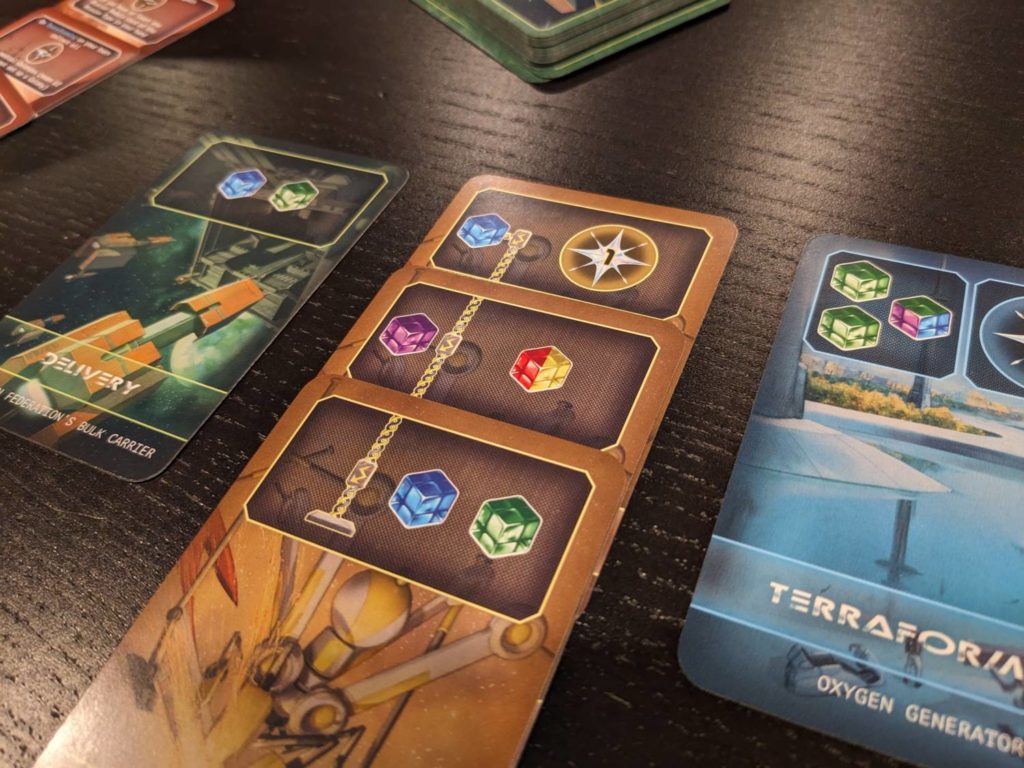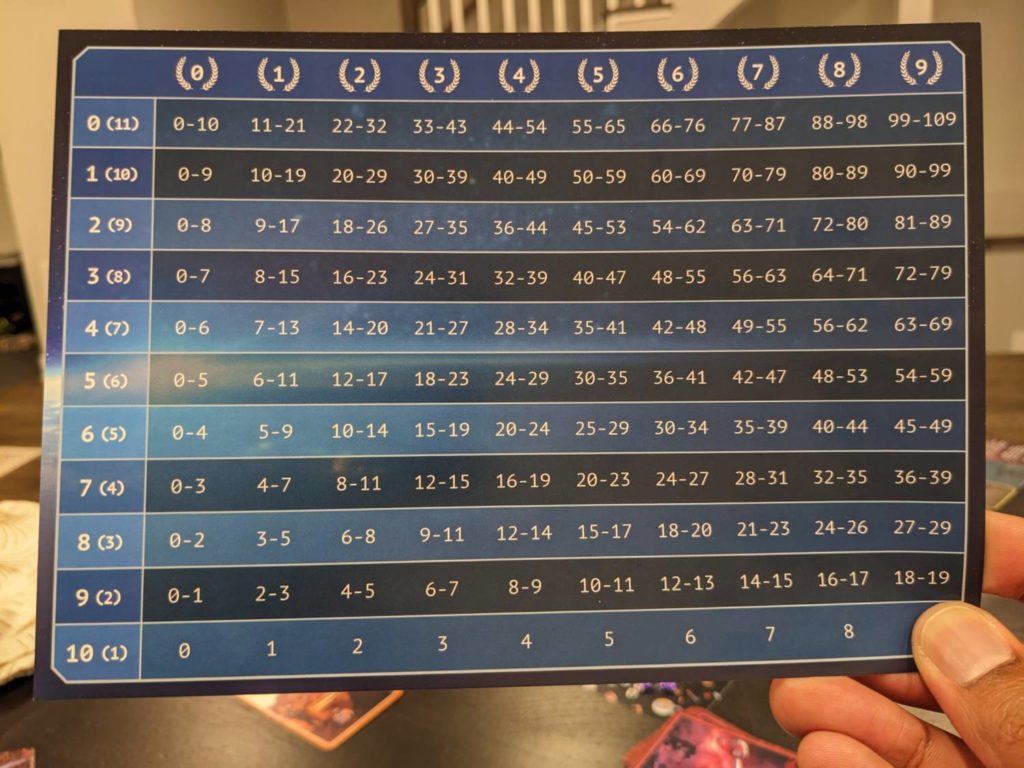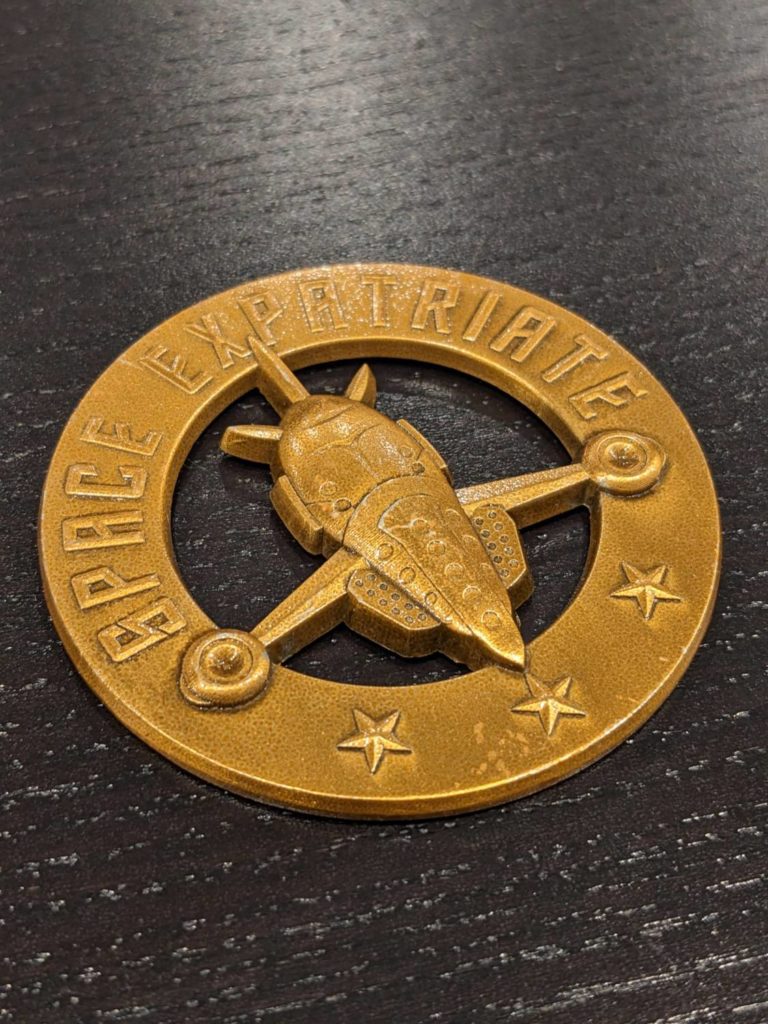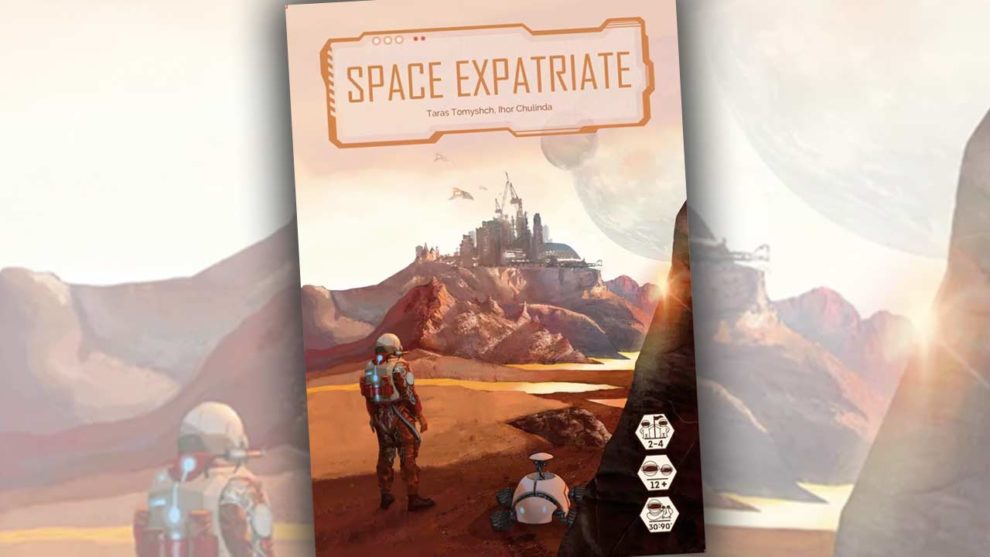On the last day of my visit to Essen last year, I had the chance to play a full game of Space Expatriate, an upcoming title from Taras Tomyshch and Ihor Chulinda and the al-Khwarizmi Games label. Taras was kind enough to teach me the game—the beauty of going to SPIEL is that the designers are usually in attendance to show off their creations—and I had a broad sense of what was happening while getting smoked in that first play.
I had a tough time getting Space Expatriate back to the table, in part because I prioritize games that are finalized and/or set with market dates when a game will hit retail. Fast forward to the spring, when Taras posted a Publisher Diary on BGG detailing his experience last fall; it was a reminder that I needed to revisit the game to see how my opinions changed outside of the SPIEL environment.
News on the game has been light. However, I take the privilege of covering review copies seriously and Space Expatriate was one of the last review copies on my shelf. I put the game through its paces with two different groups to see how it lands with gamers in my circles. The question I asked after every play—would you play it again?
The answers told the majority of the story. In a world full of choices, I am concerned that Space Expatriate will struggle to rise above the competition.

Docking Station
In Space Expatriate, 2-4 players will lead unseen private companies in a quest to terraform other planets before the competition. By scoring Terraforming Points (TPs) and building Colonies, each player will use a somewhat complicated matrix to determine their final Victory Point (VPs) total, anywhere from 0-9 points.
I don’t think Space Expatriate is a complicated game, but it is a little tricky to describe. What I’ve tried when teaching the game to players here in the US—Space Expatriate is a combination of elements from Sidereal Confluence, any tableau builder in history, and Puerto Rico thanks to the active player benefit of selecting that turn’s main action.
On a turn, the active player selects one of the four main actions: Delivery, Engineering, Terraforming, or Military. Military forces a power check between each player’s Military tableau to see who has the most Supremacy and Inferiority tokens, but mainly it’s a way to draw more cards into hand. Engineering allows players to place cards into their tableau, with the active player being allowed to dock two extra cards into their tableau.
Delivery is a bit trickier, at least the first few times you play Space Expatriate. The Delivery step turns Space Expatriate into Sidereal Confluence: produce cubes, convert some of those cubes into more cubes or TPs, then send any remaining cubes into a series of scoring cards that provide even more TPs. During the Delivery step, there won’t be much talking, but there will be a lot of heads-down action for the players who are running their engine, a bit like the back half of a turn of the game Furnace.
Terraforming? During this action, players can spend cards from their tableau to build Colonies, and when a certain number of Colonies have been built, the game wraps up at the end of the current round. Colonies provide ongoing powers to their owner, and may grant ongoing scoring opportunities depending on the card.
After each player has taken one card from the market, military might is checked to see who will become the next round’s first player, and play continues until the scoring condition is met.
A question came during one of my plays: what if no one decides to build any Colonies?
I looked back at this player with a blank stare, then checked the rulebook, then thought about it…Space Expatriate doesn’t force its win condition. Add in the complicated scoring matrix, and I realized that we may have a problem. You could, in theory, just keep scoring TPs and never try to build any Colonies; scoring 100+ TPs and having zero Colonies will net the maximum number of victory points.
Oh, wait a minute…the rulebook says the following:
“If there is no corresponding column in the table to determine your VPs, you can do the calculation as follows: find the row corresponding to your number of Colonies. You will earn 1 VP for each number of your TPs equal to the divisor (which is the number between brackets found next to the Colonies number). That is: you divide your TPs by the relevant divisor. The quotient will be your number of VPs.”
Oh boy…

The Rulebook
There’s no getting around it, friends—the rulebook for Space Expatriate is a major deterrent. In part, that’s because it was likely not written by a native English speaker. Everyone in my network had issues with the text on the cards, and I had a major issue parsing out what the rulebook was trying to say to describe certain actions. While this is not necessarily a flaw, it’s worth calling out since I am a native English speaker.
The sample text provided above is another example. It isn’t always crystal clear what’s possible on a turn. Worse, it was confusing to many players when they were told that the Delivery action is the only time when they would be running cubes through their engine…but the Engineering and Terraforming cards are involved in the engine.
That means that when you select an Engineering card, your mind is thinking: “now I get to run my Engineering cards.” Nope! The Engineering action, featuring the Engineering cards, is to simply place cards from your hand into your tableau, and nothing else. These types of questions really left players confused as they planned their turns in early plays, and I can see why. Puerto Rico uses the active player benefit, so it was natural that players had that game in mind; when picking, say, the Captain action, you do Captain things. When you select Builder in Puerto Rico, you build buildings.
In Space Expatriate, when you Terraform, you remove cards from your tableau to “terraform” a new colony. But players often thought they would get cubes from their engine to score more points, because that’s what the Terraforming cards do when taking the Delivery action.
Again, the game isn’t difficult, but it IS counterintuitive.
Getting past these issues, the guts of Space Expatriate are interesting. Deciding when to build a Colony versus trying to run cubes through the engine to score points is interesting. The powers on those Colony cards make them all worthy of pursuit. Timing your Military actions so that you can maximize the card draw based on Superiority over other players is a key element of keeping your hand size large.
Still, it was interesting to see all players gravitate towards the same goals: score as many points as possible, then gold rush the Colonies. Building 3-5 Colonies and scoring at least 60 points feels like the sweet spot for scoring 8-9 VPs; that’s probably going to be enough to win, at least until somebody tries to explain that scoring mechanic again!

Interesting, But…
Space Expatriate does some interesting things, in a package that is newer than something like Puerto Rico and shorter than a game such as Sidereal Confluence. The cards do the job and after even a second play, the edge-case rules and the format of how actions play out become very easy to understand.
My struggle? Figuring out where this game fits in a world where other games seem to do these same mechanisms better. Consider Furnace; the bidding action is the star there, but it’s a cube converter that plays faster and accomplishes most of what I want out of a game like Space Expatriate. Sidereal Confluence is a three-hour game at its max player count (nine), but Space Expatriate could be anywhere from 1-2 hours. I’d happily take the extra hour to bang out a game of Sidereal Confluence since it is so interactive.
The theme in Space Expatriate is light; I’m not sure that’s a selling point. Space Expatriate falls into a tough place—it’s fine, a solid mid-range production with a spotty rulebook. It uses familiar mechanics, but that drove me on one occasion to ask players if anyone had a copy of Puerto Rico around to play that game instead.
The scoring mechanic should be easier to understand; I was surprised how often hobbyists seemed to struggle with finding the right balance with their playstyle. Again, there’s nothing stopping players from simply hoarding TPs until they get to 80, 90, 100+ points then pursuing Colonies to drive the end game. Or, not, because players actually score more points the less Colonies they build.
I’m glad I got Space Expatriate back to the table, to see it in a different light. I don’t know if this game will eventually come to market or not, but I’m curious (and maybe a little hopeful?) to see if additional tweaks are made to the design before it comes to the masses.











Thank you so much, Justin, for the fantastic review! Our meeting was truly enjoyable!
I wanted to share some exciting news with you. Space Expatriate made its debut in the European retail market shortly after Spiel ’22. However, being a new player in the industry, we made a conscious decision not to rush things. Instead, we focused on gathering valuable feedback, like the one mentioned in the article. This feedback will play a vital role in helping us make improvements and add some exciting twists before we take the game further.
Make sure to stay tuned for updates by subscribing to our Instagram and BGG page. We’re determined to make Space Expatriate really shine!
Warmest regards,
Taras